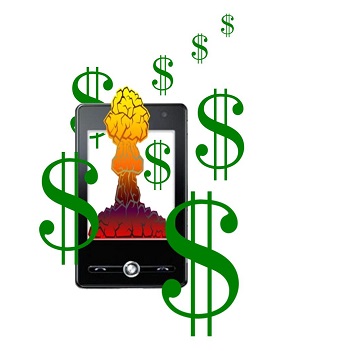The popular messenger app has just launched this new wallet service to users in this market.
The exceptionally poplar messenger app has now announced the launch of a WeChat mobile payments service that is now available to be used as a wallet application by consumers in Hong Kong.
The WeChat Pay service provides Hong Kong consumers with the ability to pay for purchases within the app.
The idea behind the WeChat mobile payments features is that as consumers use the app, they can buy what they want without ever having to exit the application. Essentially, it means their mobile wallet goes where they do while they’re using their smartphone or tablet. According to the Tencent head of Hong Kong and Taiwan Office, International Business Group, Norman Tam, “We are so excited to bring WeChat Pay, a new mobile experience that allows users to pay on the go in the simplest way, to Hong Kong.”
Tam explained that WeChat mobile payments provide both seamlessness and security to m-commerce.
 He explained that the mobile app has been specifically customized for users in the Hong Kong market. He said that while WeChat Pay gives users a solid mobile wallet option, it also provides “our partners with the benefit of a direct connection to WeChat’s massive community that other payment platforms cannot provide. This is truly a triple-win for us all.”
He explained that the mobile app has been specifically customized for users in the Hong Kong market. He said that while WeChat Pay gives users a solid mobile wallet option, it also provides “our partners with the benefit of a direct connection to WeChat’s massive community that other payment platforms cannot provide. This is truly a triple-win for us all.”
In order to be able to use the WeChat Pay service, users must enter their Visa or MasterCard information into their accounts in the app. In order to boost the security level of the transactions, users are then prompted to create a unique six digit PIN that they will need to remember and use every time they want to complete a purchase transaction within the app.
The setup process is meant to be quick and easy. Once it is complete, users gain the ability to immediately purchase products and services by tapping their smartphones on point of sale reader devices. Upon the launch of the WeChat mobile payments service, users are able to buy transportation fares, tickets, and travel products. According to reports on the new feature, there will be additional categories coming soon.
TrendForce predicts surge of the global mobile payments market through 2019
The global mobile payments market is expected to surge this year. TrendForce, an analyst firm based in Taiwan, has released a new report that predicts the strong growth that the market will experience, with growth expected to pick up momentum through 2019. According to the report, the number of mobile payments being made is expected to reach $620 billion by the end of this year, up from the $450 billion that was recorded in 2015.
Companies look to find a place in China’s mobile commerce market
TrendForce believes that Apple Pay, Samsung Pay, and similar services from large companies will become more popular throughout the world. The growth of the mobile payments market is expected to be secured in China, where companies are fighting for the favor of those interested in mobile commerce. China is considered the world’s largest and fastest growing mobile payments market, with several companies specializing in digital commerce having found major success by engaging the growing number of mobile consumers.
Alibaba and Tencent ensure that consumers are involved in the mobile commerce space
 Massive companies like Alibaba and Tencent have established a powerful foothold in the mobile payments market. These companies have ensured that it will be difficult for other companies to compete in China. These companies have also succeeded in making mobile payments more secure, which has created a great deal of confidence among consumers and ensuring that they will participate in the mobile commerce space.
Massive companies like Alibaba and Tencent have established a powerful foothold in the mobile payments market. These companies have ensured that it will be difficult for other companies to compete in China. These companies have also succeeded in making mobile payments more secure, which has created a great deal of confidence among consumers and ensuring that they will participate in the mobile commerce space.
Biometric technology will make the mobile payments space more secure
According to the report from TrendForce, the global mobile payments market will hit $930 billion by 2018 and $1.08 trillion by the end of 2019. By that time, mobile transactions are likely to be protected by biometric technology. TrendForce expects that more than 40% of smartphones throughout the world will be equipped with fingerprint scanners, which will be used to protect consumer information when they are making a mobile transaction. This degree of security is likely to encourage more consumers to make mobile payments in the coming years.
 He explained that the mobile app has been specifically customized for users in the Hong Kong market. He said that while WeChat Pay gives users a solid mobile wallet option, it also provides “our partners with the benefit of a direct connection to WeChat’s massive community that other payment platforms cannot provide. This is truly a triple-win for us all.”
He explained that the mobile app has been specifically customized for users in the Hong Kong market. He said that while WeChat Pay gives users a solid mobile wallet option, it also provides “our partners with the benefit of a direct connection to WeChat’s massive community that other payment platforms cannot provide. This is truly a triple-win for us all.”
 Massive companies like Alibaba and Tencent have established a powerful foothold in the mobile payments market. These companies have ensured that it will be difficult for other companies to compete in China. These companies have also succeeded in making mobile payments more secure, which has created a great deal of confidence among consumers and ensuring that they will participate in the mobile commerce space.
Massive companies like Alibaba and Tencent have established a powerful foothold in the mobile payments market. These companies have ensured that it will be difficult for other companies to compete in China. These companies have also succeeded in making mobile payments more secure, which has created a great deal of confidence among consumers and ensuring that they will participate in the mobile commerce space.